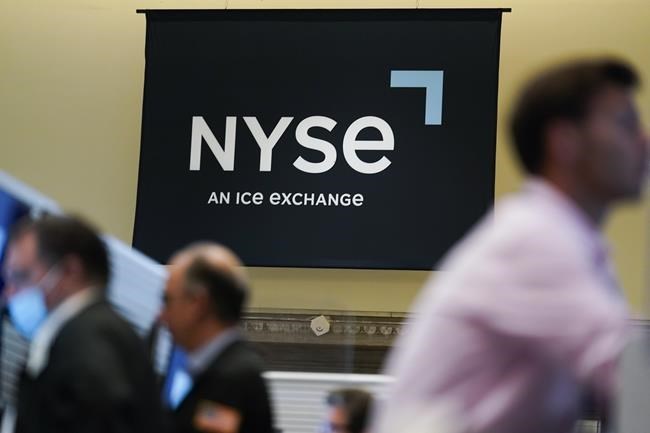NEW YORK (AP) ŌĆö Stocks gave up an afternoon gain and ended slightly lower on Wall Street Wednesday. Energy companies helped pull the market lower after crude oil prices sank. The S&P 500 fell 0.1%, the Dow Jones Industrial Average fell 0.2% and the Nasdaq lost 0.1%. The price of U.S. crude oil fell 4%. Investors closely watched testimony to Congress from Federal Reserve Chair Jerome Powell. He reaffirmed the central bankŌĆÖs determination to raise interest rates and slow inflation. Bond yields mostly fell. The yield on the 10-year Treasury note, which helps set mortgage rates, fell to 3.16%.
THIS IS A BREAKING NEWS UPDATE. APŌĆÖs earlier story follows below.
NEW YORK (AP) ŌĆö Stocks were mixed in late-afternoon trading on Wall Street Wednesday amid concerns about inflation and whether rising interest rates will help or hinder the economy.
The S&P 500 rose 0.1% as of 3:44 p.m. Eastern. The index bounced between a gain of 1% and a loss of 1.3% throughout the day. The Dow Jones Industrial Average rose 35 points, or 0.1%, to 30,559 and the Nasdaq slipped 0.1%.
The choppy trading follows a solid rally on Tuesday in what has been a turbulent period for the broader market, with daily and sometimes hourly swings from sharp gains to losses. The benchmark S&P 500 is currently in a bear market, which means it has dropped more than 20% from its most recent high, which was in January. It has also fallen in 10 of the last 11 weeks, but is holding on to gains so far for this week.
Much of the loss has been tied to concerns about rising inflation and the Federal Reserve's plan to aggressively raise interest rates in order to temper inflation's impact on consumers and businesses.
ŌĆ£There have been some new hurdles put in front of us,ŌĆØ said Sylvia Jablonski, chief investment officer at Defiance ETFs. As a result, she said, many investors are ŌĆ£sitting on the sidelines.ŌĆØ
Federal Reserve Chair Jerome to raise interest rates high enough to slow inflation, a commitment that has fanned concerns that the central bankŌĆÖs fight against surging prices could tip the economy into recession. Powell is addressing Congress this week, starting with the Senate Banking Committee on Wednesday.
ŌĆ£WeŌĆÖre not trying to provoke and donŌĆÖt think that we will need to provoke a recession," Powell said. ŌĆ£But we do think itŌĆÖs absolutely essential that we restore price stability, really for the benefit of the labor market as much as anything else.ŌĆØ
Powell's testimony comes a week after the Fed raised its benchmark interest rate by three quarters of a percentage point, its biggest hike in nearly three decades. With inflation worsening, the FedŌĆÖs policymakers also forecast a more accelerated pace of rate hikes this year and next than they had predicted three months ago, with its key rate reaching 3.8% by the end of 2023. That would be its highest level in 15 years.
The FedŌĆÖs moves are happening as some discouraging signals have emerged about the economy, including sagging spending at retailers and soured consumer sentiment. The worries over inflation and interest rates have been worsened by a spike in energy and other key commodity prices following RussiaŌĆÖs invasion of Ukraine.
Record high gas prices have been taking a bigger bite out of consumers' wallets and prompting a slowdown in spending elsewhere. That has prompted President Joe Biden to call on Congress to for three months, a move meant to ease financial pressures at the pump.
Inflation is at a four-decade high in the U.S. and has been prompting businesses to raise prices on everything from food to clothing. Consumer spending remained strong through most of the pandemic, but has been falling amid tighter pressure from inflation. Inflation is hitting records globally. reached a 40-year high of 9.1% in the 12 months to May.
Wall Street remains concerned about the Fed's aggressive policy raising the risk of a recession, but Powell said another risk involves high inflation becoming entrenched in the economy if the central bank doesn't take appropriate steps.
"We cannot fail on that task,ŌĆØ he said. ŌĆ£We have to get back to 2% inflation.ŌĆØ
Health care and real estate stocks made solid gains. Eli Lilly rose 3% and American Tower rose 2.4%. Those gains were kept in check by a pullback in energy, technology and other sectors.
U.S. crude oil prices fell 1%. Chevron fell 3.9%.
Bond yields fell sharply. The yield on the 10-year Treasury fell to 3.15% from 3.30% late Tuesday. Markets in Europe and Asia also fell.
___
AP Business Writer Stan Choe contributed. Veiga reported from Los Angeles.
Damian J. Troise And Alex Veiga, The Associated Press



